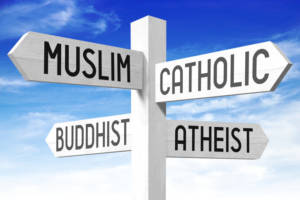Is Atheism on the Rise in Canada?

Statistics appear to show the number of Canadians who proclaim no religious affiliation, including atheism, may have increased during the last two decades.
The last two decades have brought gradual transformations to Canada’s religious landscape. Data tables from Statistics Canada appear to show that the number of Canadians who are irreligious, including adherents of atheism and humanism, may have increased during this period. Is atheism on the rise, as some sources in Canada purport? Comprehending the answer to that question requires a wider examination of recent shifts in religious beliefs within our country.
Counting Canada’s Atheist Population
As a 2013 Huffington Post article revealed, around 7.8 million Canadians disclosed on the 2011 National Household Survey (NHS) that they claimed no religious affiliation. That’s almost 24 percent of Canada’s population, and a significant increase from the 16.5 percent that claimed no religious affiliation in the 2001 survey. Notably, the NHS groups several belief systems under the “no religious affiliation” umbrella, including atheism, humanism and agnosticism, along with those who simply answered “no religion.”
Atheism on its own totaled almost 48,700 adherents, or nearly 0.15 percent of all Canadians surveyed for the 2011 version. According to Ontario Consultants on Religious Tolerance, around 18,600 declared themselves to be atheists on the 2001 edition and over 13,500 responded the same way on the 1991 survey. That would suggest a slow, steady increase over the last two decades, with their numbers more than doubling since 2001.
Are There Problems With the Numbers?
On the other hand, data from the 2011 National Household Survey has been scrutinized and criticized due to a lower-than-expected response rate. As CityLab contributor Aarian Marshall pointed out in a 2015 article, policy changes enacted in 2010 meant that response to the NHS became voluntary instead of mandatory. Only 69 percent of respondents sent back their long-form surveys, raising some serious questions about data precision in the 2011 edition as well as possibly the 2016 version. Moreover, concerns remain about accurate counts for underserved populations such as those living in poverty, immigrants, First Nations communities and people of color.
In the face of these possible trends and worries, questions arise concerning what the 2011 NHS numbers really mean. Meanwhile, the 2016 NHS’s census profile has been released on the Statistics Canada website, but the current data does not include information regarding respondents’ religious affiliation.
Understanding the Bigger Picture
With the absence of reliable numbers, journalists, theologians and scholars rely on other data sources and anecdotal testimonies to understand the larger picture of religion in Canada. A March 2015 Angus Reid Institute report revealed several key developments:
- An increase in the number of Canadians “inclined to reject religion”
- Dwindling numbers of those who “embraced religion”
- A sizable group of respondents who said they were “in between”
Nevertheless, these figures only tell part of the story. A 2015 CBC article explained that traditional Protestant Christian congregations are losing members while Catholic and evangelical churches, along with Muslim mosques and Sikh temples, are experiencing increases. Although misgivings remain about the 2011 NHS data, these observations are supported by its finding of sharp upswings in Sikh and Muslim populations between 2001 and 2011. Simultaneously, more Canadians may also be embracing Neopagan paths, African orisha-based religions or the First Nations spiritual practices of their ancestors, but it’s difficult to make any concrete guesses without solid data.
Faith in Canada: A Complex Picture
While there are serious doubts about the accuracy of NHS data on Canadian religious affiliations, some general observations can be derived from multiple sources. Atheism, humanism and agnosticism adherents in Canada may have grown within the last 20 years, but the overall picture of faith in our country is more multifaceted. With immigration causing shifts in membership and more people adopting non-Abrahamic spiritual paths, it’s important to remember that there are larger, more complex stories behind the data and headlines.

